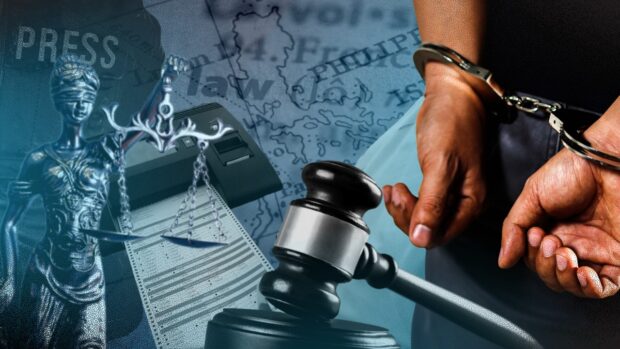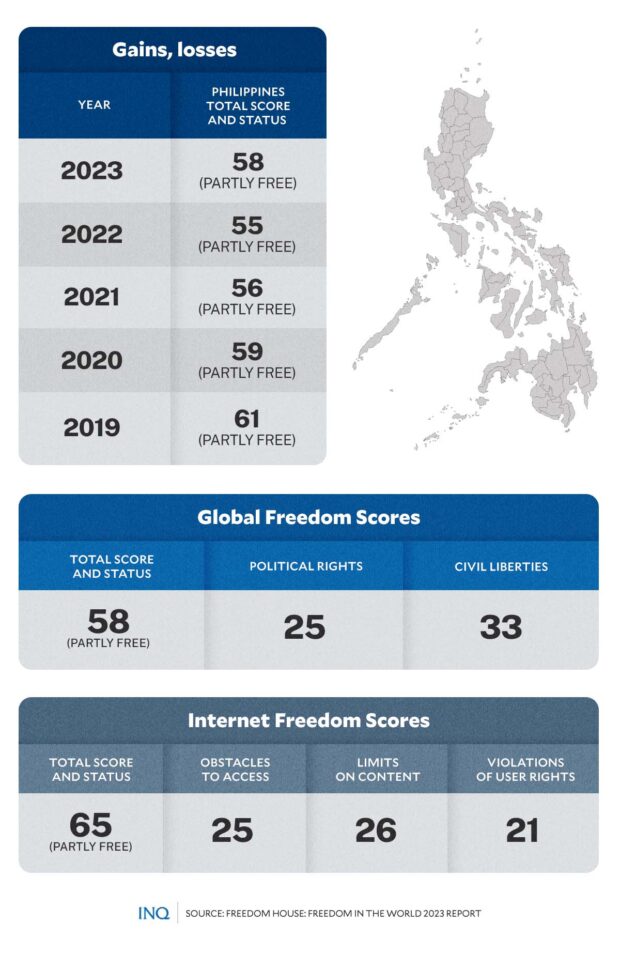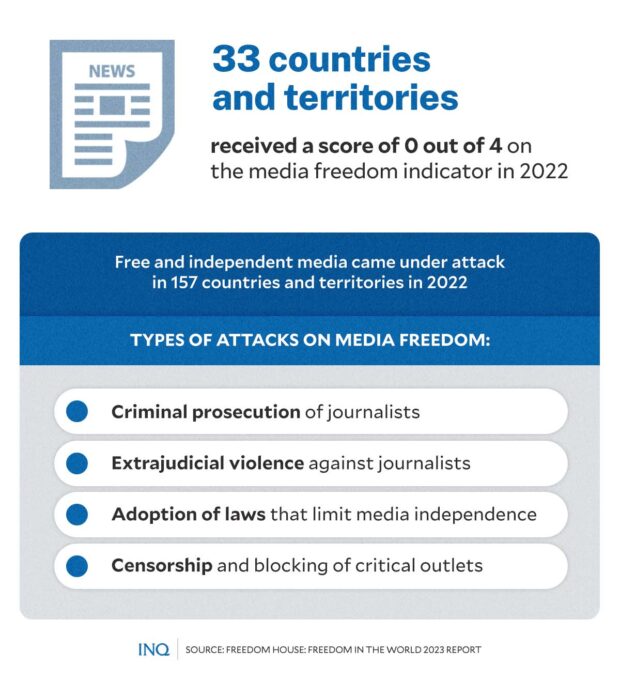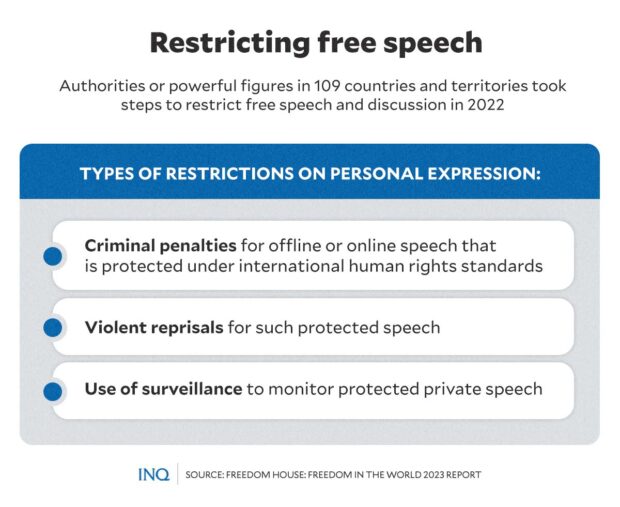PH keeps ‘partly free’ status in world freedom report
MANILA, Philippines—Due to human rights atrocities as a result of the conflict between Russia and Ukraine, as well as coups and attempted coups in several countries last year, democratic watchdog organization Freedom House said the global struggle for democracy has approached “a possible turning point.”
In the 2023 edition of the “Freedom in the World” report, Freedom House stressed that global freedom has declined for the 17th consecutive year.
It emphasized that the gap between the number of countries that registered overall improvements in political rights and civil liberties and those that experienced overall declines in 2022 was the narrowest it has ever been.
“There were signs during the past year that the world’s long freedom recession may be bottoming out, which would set the stage for a future recovery,” the report stated.
“Dramatic declines in political rights and civil liberties during 2022 were driven by direct assaults on democratic institutions, whether by foreign military forces or incumbent officials in positions of trust. War, coups d’état, and power grabs repeatedly posed an existential threat to elected governments around the world,” it added.
Out of the total 195 countries and 15 territories analyzed in the report, 34 countries showed improvements in political rights and civil liberties. While 35 countries had lost ground and saw a decline, the organization noted that it was “the smallest recorded since the negative pattern began,” which might signal “a possible slowdown in the global decline.”
The report follows a two-tiered system consisting of scores and status.
For the scoring system, a country or territory is awarded 0 to 4 points (0 represents the least degree of freedom and 4 the greatest degree of freedom) for each of 10 political rights indicators and 15 civil liberties indicators, which take the form of questions.
The highest overall score that can be awarded for political rights is 40, while the highest overall score that can be awarded for civil liberties is 60.
The status of the countries and territories was determined based on the combination of the overall score awarded for political rights and the overall score awarded for civil liberties. The freedom statuses used in the report are Free, Partly Free, and Not Free.
Among the countries and territories that saw improvements in conditions for political rights and civil liberties were Lesotho, Malaysia, the Philippines, Zambia, Kenya, Kosovo, Slovenia, and Colombia.
On the other hand, Burkina Faso, Ukraine, Tunisia, Guinea, Nicaragua, El Salvador, Hungary, Mali, and Russia had the most significant declines in aggregate scores for political rights and civil liberties.
Philippines: Partly free country
The Philippines’ aggregate score increased by 3 points from 55 in 2022 to 58 in 2023. The gain was due to an increase in the country’s civil liberties score, from 30 over 60 in 2022 to 33 in 2023.
The civil liberties scores were based on questions that are grouped into four subcategories: Freedom of Expression and Belief (4 questions), Associational and Organizational Rights (3), Rule of Law (4), and Personal Autonomy and Individual Rights (4).
The questions include: “Are there free and independent media?” “Are individuals free to express their personal views on political or other sensitive topics without fear of surveillance or retribution?” “Is there freedom for nongovernmental organizations, particularly those that are engaged in human rights- and governance-related work?”
According to the Global Impunity Index of the Committee to Protect Journalists (CPJ), the Philippines is the seventh most dangerous country for journalists. It is also one of the worst countries in convicting killers of journalists—with up to 14 murders still unsolved.
READ: Police visits stir fear in PH, 7th most dangerous place for journalists
READ: PH still among world’s worst countries in prosecuting killers of journalists
The red-tagging of journalists and human rights defenders remains a vast and dangerous red flag in the country. As of March 2022, the human rights group Karapatan, which had been red-tagged multiple times, stressed that at least 427 activists in the country were slain after being red-tagged.
READ: Badoy says red-tagging not dangerous but 427 slain activists show otherwise
Alarmed by the increasing cases of threats, attacks, and killings in the country, the member states of the United Nations Human Rights Council (UNHRC) called on the Philippine government last year to take necessary steps to address impunity against journalists, human rights defenders, and dissidents—as well as ensure a safe and enabling environment for media workers.
READ: PH media, human rights records draw UNHRC member states’ attention
Meanwhile, the country maintained its political rights score in 2022: 25 over 40. The scores for this indicator are based on questions grouped into three subcategories: Electoral Process (3 questions), Political Pluralism and Participation (4), and Functioning of Government (3).
Some examples of the questions under the political rights indicator were: “Was the current head of government or other chief national authority elected through free and fair elections?” “Are the people’s political choices free from domination by forces that are external to the political sphere, or by political forces that employ extrapolitical means?’
“The Philippines also held elections, and while the son of a former dictator won the presidency, the competitive campaign had the effect of mobilizing millions of young voters,” the Freedom House report said.
The Commission on Elections (Comelec) reported that 33 percent of voters registered for the national elections last May were aged 18 to 33—many of whom voted for the first time.
Experts believed that the young voters would play a significant role in the outcome of the elections mainly because they are perceived as more technically oriented than the older generations, are heavily influenced by social media, and have no direct experience of martial law.
READ: First-time voters: Key poll battleground
Media freedom, personal expression in shackles
“Freedom of expression, a fundamental component of democracy, has been under sustained attack around the world for the last 17 years,” the report said.
“Of all the indicators that Freedom in the World uses to assess political rights and civil liberties, freedom of the media and freedom of personal expression have declined the most precipitously since 2005,” it added.
Last year, the number of countries and territories that received a score of 0 out of 4 on media freedom indicators dramatically rose from 14 to 33 during the 17 years of global democratic decline—signaling that freedom for independent journalism has plummeted.
Freedom House explained that in the past years, journalists across the globe faced persistent attacks from autocrats and their supporters. Unfortunately, they continue to get inadequate protection from intimidation and violence, even in some democracies.
“Journalists routinely face harassment and threats in reprisal for their efforts to expose corruption,” the watchdog organization said.
“Authorities in a variety of countries failed to offer effective protections to media professionals who were at risk of extralegal violence from non-state actors,” it added.
It added that media freedom was under heavy pressure in at least 157 countries and territories in the past year.
Aside from journalists and media workers, many ordinary people were also restricted from expressing their views, whether online or off.
“Many governments have been quick to reapply existing repressive laws to the online sphere and adopt invasive technologies to monitor digital communication. Others continue to resort to old-fashioned methods of control over speech, like the use of human informants and physical searches,” the report said.
“The result is a pervasive sense of fear among civic activists, members of marginalized communities, and average citizens when discussing sensitive topics in public, semipublic, or private settings.”
At least 15 countries and territories analyzed in the Freedom of the World report from 2005 to 2022 scored 0 out of 4 on the personal expression indicator—this signaled “a nearly complete lack of freedom to voice antigovernment opinions even in private.”
Last year, 109 countries and territories took steps to restrict free speech and discussion among ordinary citizens.
Among the types of restrictions on personal expression were:
- criminal penalties for offline or online speech that is protected under international human rights standards;
- violent reprisals for such protected speech;
- use of surveillance to monitor protected private speech.
TSB
RELATED STORIES:
Hope flickers for victims as ICC to resume investigating Duterte drug war
Maguindanao massacre: The wound of PH impunity that will never heal



